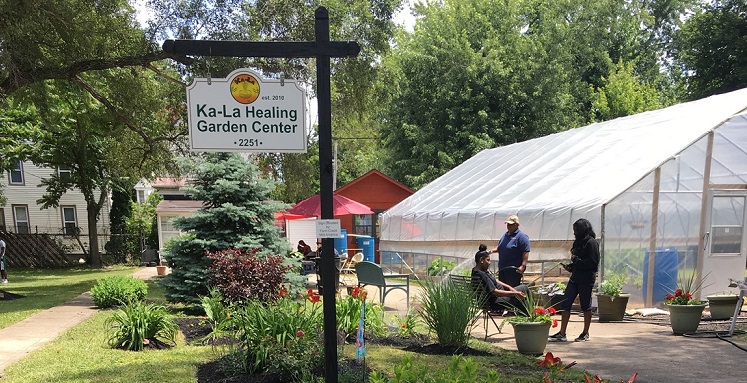By Tanya Holmes and The FARE Project
This piece features Tanya Holmes of the Ka-La Healing Garden Center, a participant in The Food Trust’s FARE (Food Access Raises Everyone) Project and funded partner of the Center for Healthy Food Access. With support from Saint Luke’s Foundation, The Food Trust is implementing a comprehensive and collaborative approach to food access in Cleveland and surrounding Cuyahoga County. The FARE Project is guided by a diverse advisory committee made up of local stakeholders and provides technical assistance, strategic planning, and additional resources for local efforts. The Food Trust’s Center for Healthy Food Access is a national collaborative effort supported by the Robert Wood Johnson Foundation to increase access to and demand for healthy foods and beverages in underserved communities. Through the Center, mini-grant funds were made available to relevant groups in Cleveland and Cuyahoga County. The FARE Project’s advisers nominated local grantees, and more than 20 grassroots groups and residents — including nutrition educators, urban farmers, and faith-based organizations — are now funded partners of the Center and an integral part of The FARE Project.
Tanya Holmes is the founder, owner, and operator of Ka-La Healing Garden Center. It is her vision to build a safer and healthier environment for residents in the Central, Fairfax, and surrounding neighborhoods of Cleveland. Holmes, a graduate of the Neighborhood Leadership Development Program, has created an interactive community space that includes an urban garden, a summer jobs program, a networking and entrepreneurship group for women, and more. Fresh produce grown on-site is sold every Saturday at her farm stand, which accepts SNAP and senior vouchers
With funding from the Center for Healthy Food Access, Holmes is finalizing a business plan and establishing a 501(c)(3): The Ka-La Healing Garden Foundation. “I’m getting to a place of stability, where I can purchase things that will make the garden run smoothly,” she says. She is also using the funds to create materials for nutrition classes and cooking demonstrations at the garden and farm stand, as well as to purchase a commercial hot plate and rain barrels.
Summer 2017 marks the third year of Holmes providing jobs for 20 young people ages 14 to 24 through the Summer Youth Gardening Training Program. In partnership with Youth Opportunity Unlimited, program participants learn about urban agriculture, nutrition, professional development, and skills they can use to start a garden in their own community. In her words:
“I feed them, I teach them, I have them create vision boards. I ask them: ‘Where do you want to see yourself in three years? Where do you want to go to college?’ They’re learning about food and where it comes from, and entrepreneurship skills. It’s a safe place for them, an outlet. This is hard work. Some of these kids have never seen a seed before. Seems so simple. But they'd never seen it before. Kale, eggplant, squash...most of the kids never ate any of these vegetables.”
Through partnership with the Greater Cleveland Food Bank, Holmes provides free breakfast and lunch to participants in the summer jobs program as well; she’s also been known to provide work for additional youth from the neighborhood. She explains, “I saw kids coming to work hungry, not having lunch. I reached out to [U.S. Representative] Marcia Fudge, and she said, ‘I'm going to help you,’ and then reached out to Farm Credit of Mid- America, which provided funding for a cabin and refrigerator. Following that investment, I partnered with the Food Bank. Now, they send a truck full of lunches that we give out to kids over the summer.”
Holmes also has a very important helper in the garden. “My grandson, Alonzo, is seven years old, and he’s been with me in the garden since he was three. He helps with the soil, mulch, locking up the place; he’s my little assistant.”
When asked what inspires her, Holmes responds: “It's more than farming and gardening for me. It's about taking over our neighborhood and introducing healthy food to our children and adults. I'm here not to just grow and sell vegetables; I'm here to teach the community entrepreneurship, how to eat healthy foods, and the importance of cleaning their neighborhood. I'm teaching them to love themselves and not to let anyone ruin their day…Urban farming is about bringing the community together, reducing crime, helping neighbors feel comfortable coming outside. I do street clean ups, and I’m in charge of the kids’ park across the street.”
As for what’s next for Holmes?
“So many people want to partner, but I need capacity. Now, with nonprofit status, I could partner with the city on things like a re-entry program. Things are going so great with the business. I'm outgrowing my home…I’m going to need an office space or a small building!”
*The views and opinions expressed in this article are those of the author and do not necessarily reflect the position of The Healthy Food Access Portal.
